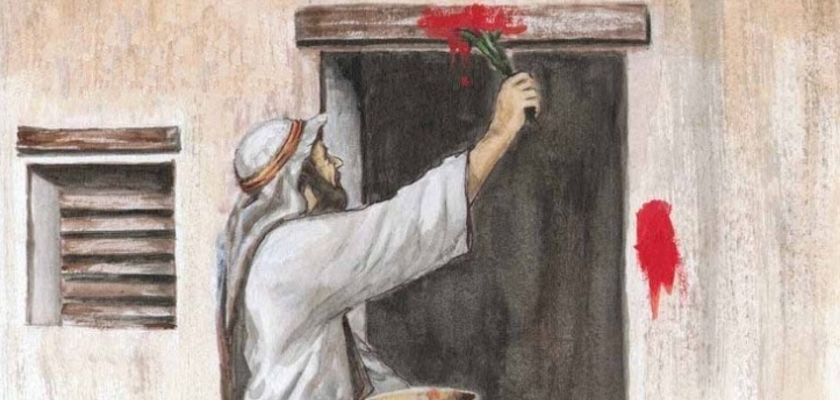
If It's Spring, It Must be Murder
Spring is that time of year when the temperatures are mild, the air feels crisp and it makes you want to be outside. In order to hear campus mall preachers wailing on people enjoying the weather with threats of hell, damnation and the nerve for liking things they don’t.
And why not? Spring is a time for renewal and rejuvenation when flowers and crops are in bloom, showing everyone the rhythm of life emerging from the grips of winter. And it’s also a time that has become redefined by two famous stories of divine murder: Passover and Easter.
Now technically, both holidays are really the same, as the word “Easter” in English merely covers up the Aramaic “pascha,” which is, of course, “peach,” celebrated by Jews the world over for their escape from Egypt. It’s all about redemption from slavery, says one religion. It’s all about the escape from death, says another. Easter celebrates the bodily resurrection of a Jewish carpenter in a then troublesome and backward Roman province called Judea. Nowadays it’s the troubled and backward province of the United States called Israel.
Both religions ignore the more salient aspect of their narratives: the murder of the Egyptian firstborn and the murder of an innocent man, Jesus the Nazarene. For the Passover story, it’s a Broadway spectacle worthy of Cecil B. DeMille: a cast of thousands (well, actually millions since the 600,000 figure in the Bible refers only to men, not their families), and increasingly expensive plagues that culminates in a killing spree that spares neither human nor animal. All because of Pharaoh’s alleged “hard heart,” which is actually the manipulations of Israel’s god, by why quibble? With such a casual disregard for human life, the cry of despair rises from Egypt and the Israelites make their escape. Over the centuries, this story glides over the murder part and the subsequent drowning of the Egyptians at the Sea of Reeds (sorry, no “Red Sea”) into an act of divine love by the curiously temperamental desert god of the Hebrews. Of course later he kills most of the escapees, but that’s another story.
For the Christians, there’s great, almost exclusive emphasis on the resurrection. Except you can’t have a resurrection without a dead body and killing Jesus is the focal point of the entire Passion narratives. By all accounts, Jesus is an innocent person who still gets railroaded into a Roman death penalty (with exclusive blame on the Jews), only the joke is on the authorities because all of this was *supposed* to happen anyway. Because while previously the god of Israel pulled out all the stops with the Egyptians, he’s now going to demonstrate the true extent of his alleged love for humanity by letting a single innocent person die a horrible, agonizing death for the redemption of mankind’s sins. So in this narrative, redeeming Hebrews from slavery by killing Egyptian firstborn was just a prelude to the murder of his own son (who is also himself, according to the Nicene Creed) for which we should associate the rebirth of the landscape during the spring after winter.
Judaism and Christianity are the only two religions in the world that have turned the natural cycle of the Earth into a paean of the redemptive effects of murder, for which we are all supposed to be grateful. Passover was originally an agricultural holiday (just like about every other commanded seasonal observance in the Bible) that became connected to the Exodus from Egypt which probably did not happen as depicted. But with time and reflection, a story of flight from Egypt morphed into an elaborate tale of increasingly outlandish actions on the part of the Hebrew god to demonstrate how powerful he really is. This done in the face of the utter defeat of the Hebrew tribes unlucky enough to be deported to Babylon, and whose priests were asking how this even happened in the first place, that god would allow such bad things to happen to his own people.
While Easter is Passover, there’s no agricultural connection but an implied one: the resurrection of the god-man makes harvests possible and flowers bloom. A little like Persephone, whose return from the underworld during the spring promised a return to life (and the delight of her mother Demeter) each year. Yet the connection between both traditions is not agricultural, but of course, killing. Both acts of divinely-sanctioned murder are the culmination of two distinct stories that are thematically connected. It’s hard to imagine it otherwise, as the writers of the Gospel stories had only one pattern to follow (Hebrew scripture). So seeing that god kills to redeem, so the story of the crucifixion of Jesus as a need to redeem everyone. One wonders what Jesus would have wound up doing had the Exodus story not climaxed with the death of the Egyptian firstborn.
Armed with this notion of divine care, university mall preachers are out in full force, exhorting people to mark the beauty of spring with the story of a god killing people to demonstrate his love for humanity. It’s perfectly obvious, then, why such great weather that prompts people to be outside should be interrupted with the screeching of evangelicals who want to tell you how horrible you are and that god’s love is so great, he kills people in order to renew something, something something.
Can’t we just enjoy life?